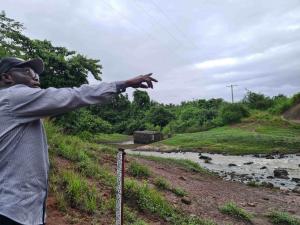
Over two-thirds of Togo’s water resources are shared, notably through the Mono River basin (shared with Benin) and Volta River basin (shared with Benin, Burkina Faso, Côte d’Ivoire, Ghana and Mali), as well as aquifers in the coastal sedimentary basin (shared with Ghana, Benin and Nigeria).
In a context of growing pressure on Togo’s water resources due to the effects of climate change, pollution, as well as growing urban development, Togo currently faces numerous challenges, notably the need to strengthen both quantitative and qualitative monitoring of water resources, and the need to implement a cooperation mechanism for managing the coastal sedimentary basin, which are the main source of water in its capital city, Lomé. Climate change adaptation through the development of innovative measures and water management techniques is also a priority.
In response, Togo has just approved its plan of action to implement the Convention on the Protection and Use of Transboundary Watercourses and International Lakes (the Water Convention, the secretariat of which is provided by the UNECE) during a national workshop organized jointly with the Economic Community of West African States (ECOWAS) Commission. The main sectoral stakeholders representing the Administration, local governments, and technical and financial partners who are active in the country took part in the workshop, which marked a crucial step in implementing the Water Convention in Togo.
Togo became a Party to the Water Convention on 27 December 2021, in order to strengthen its institutional and political framework for more sustainable and concerted management of its water resources.
Togo is already a Party to the Conventions on the Status of the Volta and Mono Rivers, on the creation of Basin Authorities for both of these rivers, and on the implementation of principles and obligations of the Water Convention. A national implementation strategy and plan of action will allow Togo to consolidate its water governance at the national and transboundary levels.
The exercise in developing an implementation strategy and plan of action has been led by Togo’s Minister of Water and Village Hydraulics and allows the country to identify its main challenges with regard to implementing obligations stemming from the Convention, as well as current opportunities to make the Water Convention a reality on the ground through legal, administrative, economic, social, and environmental measures and actions.
The workshop was organized by the Ministry of Water and Village Hydraulics, with support from the ECOWAS Commission and the Water Convention secretariat, and brought together 60 participants, notably representatives of various sectoral ministries, who were able to appreciate, share comments and suggest changes with a view toward finalizing the plan of action. The presence of representatives from neighboring countries and major basin organizations, that is, the Volta Basin Authority and Mono Basin Authority, promoted an exchange of experiences and a discussion on implementing the Convention at the regional level.
The Minister of Water’s Cabinet Director, Mr. Affo Bôni Adjama, reminded participants on behalf of the minister that activities defined in the plan are in line with national priorities for comprehensive management of water resources and access to drinking water and sanitation, such as the 2020-2025 Government Roadmap or strategic plan for access to water and sanitation for all by 2030, thereby confirming the Convention’s role as a catalyst. Mr. Barros Bacar Banjai, the Resident Representative of ECOWAS, reiterated that “the water resources policy for West Africa adopted by ECOWAS in 2008 encourages ECOWAS Member States to adhere to or ratify and implement the International Water Conventions. Based on this, the Commission has provided Member States with support to carry out their processes and a draft Directive on Shared Water Resources Management was prepared, with adoption expected during 2023”. This regional political context undeniably promotes conditions favourable to supporting the development of transboundary water cooperation among various development stakeholders in West Africa.
The workshop was also an opportunity to hear other technical and financial partners who are present in Togo and the region, such as the Global Water Partnership- West Africa, the African Development Bank and the Adaptation Fund, or GIZ, which expressed their interest in supporting the implementation plan’s thematic activities that are part of their strategic priorities and those of the government.
Togo is currently preparing to finalize the plan and identify the priority actions for upcoming implementation, with support from certain technical and financial partners, as well as the ECOWAS Commission.
Togo received support from the Convention secretariat for developing the implementation strategy and plan of action, which is part of the European Union-funded project “Promoting Membership to the Water Convention,” which aims to support membership to and implementation of the Water Convention and thereby support transboundary water cooperation and sustainable and peaceful management of shared water resources.